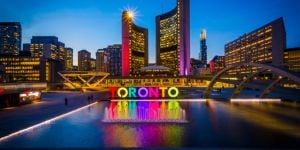
Securing a place to stay in Toronto might be one of your top priorities when relocating to Toronto, regardless of the duration of your stay. The city offers diverse options for everyone, although the demand often exceeds the available supply. This article guides on finding accommodation as an expatriate in this sprawling cosmopolitan city.
Rental prices in Toronto
In Toronto, rents are generally expensive, posing challenges for individuals with lower incomes. The cost varies depending on the type of residence, whether it's a bachelor, studio, multi-bedroom, or shared apartment. According to a September 2023 report from rentals.ca, renting a one-bedroom apartment in Toronto typically costs around CAD$2,620 monthly, while a two-bedroom might set you back CAD$3,413. If you're eyeing a three-bedroom apartment in the downtown core, Numbeo estimates a price of approximately C$4,201.54 as of September 2023. The Zumper site confirms that even for a studio apartment, the rent remains high, hovering close to $2,000 CAD per month for the same period. Opting for a luxury apartment will come with a significantly higher monthly cost, often reaching several thousand Canadian dollars.
Toronto's cheapest neighborhoods
The Junction
The Junction is an affordable neighborhood of young professionals, newlyweds, and singles. It's an eclectic neighborhood, and its main street, Dundas West, is packed with restaurants, bars, boutiques, and local businesses. Here's the average rent in The Junction in September 2023 by unit type and size:
- one bedroom - CA$2,010;
- two bedrooms - CA$2,775;
- three bedrooms - CA$3,600.
Scarborough
Arguably the least expensive of all Toronto neighborhoods, Scarborough welcomes many newcomers, especially those on a tight budget. Scarborough is a government-subsidized area, which explains the lower rents.
Average rent by unit type and size:
- 1 bedroom - CA$2,114 (March 2023);
- 2 bedrooms - CA$2,725 (September 2023):
- 3 bedrooms - CA$3,064 (September 2023).
Toronto's most popular neighborhoods
Toronto covers a vast 630 square kilometers and houses over three million people. The city's major attractions, like the CN Tower, Ripley's Aquarium of Canada, and Canada's Walk of Fame, are situated in the Entertainment District. The renowned Toronto International Film Festival (TIFF) unfolds here annually in early September. The area is buzzing with comedy clubs, theaters, nightclubs, and numerous bars. Old Toronto and the Distillery District are also hotspots for tourists, with higher accommodation costs, offering a downtown experience.
Close by, popular shopping areas include Forest Hill, Rosedale, the Annex, Chinatown, Kensington Market, Greek Town, Spadina, Little Italy, Little Portugal, and Parkdale. Yorkville, once a hippie enclave, has undergone gentrification and now serves as the go-to spot for fashion enthusiasts. On the other hand, the Annex is known as a student district
There are many factors to consider when choosing where to live, such as your budget, proximity to your workplace, your school or your children's school. No matter where you choose to live, make sure you're comfortable in the neighborhood, close to shops and with good access to transportation. Toronto's public transit system is highly efficient and popular with many Torontonians. The Toronto Transit Commission (TTC) operates eleven streetcar lines, four subway lines and over 170 bus routes. Many buses and streetcar lines operate only at night. The subway operates from 6 am to 1:30 am the following day, except on Sundays when it opens at 8 am. As in all big cities, Toronto has a lot of traffic jams.
How to find accommodation in Toronto
Before looking for a permanent place to stay in Toronto, consider opting for temporary housing. Whether it's a motel, hotel, bed and breakfast, or an Airbnb, depending on your budget. Staying temporarily provides the opportunity to explore your new surroundings and evaluate whether the neighborhood suits your long-term needs. This waiting period is crucial, preventing you from making hasty decisions that you might regret later. It's advisable to prolong your stay in temporary housing rather than hastily settling into permanent accommodation that may not be the best fit. Take the time to familiarize yourself with the neighborhood's lifestyle, public transportation, and cultural aspects.
If you're on a tight budget, you can choose a shared accommodation, which will also enable you to expand your circle of friends quickly. Check out real estate ads in the local press or Facebook groups dedicated to housing in Toronto. Rental offers are often posted in public places like bus stations, libraries, and community centers. Several websites also offer rental, sale, and sharing services in Toronto, including :
- Craigslist;
- Remax (sales);
- Century 21 (sales);
- Rent Board;
- PadMapper (rental).
Many students and temporary residents choose to share a flat. It doesn't take long before you come across someone open to sharing their home with you. Renting a room in a shared house typically falls in the range of $700 to $800 CAD per month. If you're not ready to venture into solo housing hunting, there are specialized agencies geared towards assisting newcomers. Toronto Rentals, for example, is a well-established agency that operates both online and in-person.
Lease regulations in Toronto
Before renting in Toronto, be informed about the rules and customs, and what your rights are as a tenant. For instance, landlords are not allowed to ask you personal questions, such as about your country of origin, sexual preferences, or any other matters that would be an invasion of your privacy. Nor does he have the right to ask you for your Social Insurance Number (SIN) or a copy of your ID for safekeeping. It's important to note that your SIN is confidential and should only be given to your employer, bank, or tax office.
However, landlords have the right to ask you for documents to see whether you can pay the rent. This may include proof of employment, a guarantor's certificate, or references from a previous landlord. You may also be asked to carry out a credit check to ensure that you are not in debt. As a newcomer, you won't have a credit history in Canada until you've opened a Canadian bank account and started paying your bills, such as telephone bills. If you persevere in your search for accommodation, you'll always find understanding landlords or landlords who are used to renting to newcomers.
The landlord might also request a security deposit, which he will keep until your last month of rent. Typically, this amount equals one month's rent. While the lease is ongoing, the landlord is not permitted to increase the rent; however, they may consider doing so at the end of your lease. The Ontario government determines legal rent increases based on the inflation rate. If you decide to move out before your lease ends, you must continue to pay the rent until the agreed-upon rental period concludes. Alternatively, your landlord may agree to let you assign your lease or sublet the property to another person. In Ontario, a lease can be either a verbal or written agreement, though having a written one is always a safer option! Regardless, it's crucial to clarify the lease duration and the services covered in the rent with the landlord. Typically, most rental contracts span one year, and you might be responsible for additional costs like water, electricity, and heating. If feasible, consider touring the premises before finalizing the move. Exercise caution when booking accommodation from abroad and facing requests for advance payments. Numerous fraudulent ads and scammers target newcomers in urgent need of accommodation, so it's essential to be vigilant.
The landlord may try to evict you if he thinks you've breached the terms of the lease. If you don't understand the specifics of the various clauses of the contract, or if you have any doubts, you can contact the Landlord and Tenant Board (LTB) for more information on the regulations in force.
Property insurance in Toronto
Whether you're an owner or a tenant, it's important to have an insurance for your home. You'll find several insurance companies on the Internet. Don't hesitate to ask your banker or insurance agent.
Buying a house or apartment in Toronto
If you've decided to buy a home in Toronto, you need to know that you'll face challenges if you're not a Canadian citizen or permanent resident. Canadian banks use your credit history to determine your eligibility for a bank loan. To find out more, visit the Financial Consumer Agency of Canada website. In addition, the Non-Canadian Residential Real Estate Purchase Prohibition Act prevents non-Canadian citizens and temporary residents from purchasing residential real estate in Canada for 2 years. This law came into force on January 1, 2023.
To buy a house or apartment in Toronto, we recommend hiring a real estate agent. He or she will help you prepare your offer to purchase. You can find contacts for these professionals in the yellow pages of your telephone book or by searching the Internet. Buying a house in Toronto is very expensive, and there are many costs to consider: those of the real estate agent, lawyer or notary, work-related fees, annual property taxes, home insurance, registration fees, costs for heating, electricity, hot water, sewage, etc., so you absolutely must stick to your budget.
When looking to purchase a house or apartment in Toronto, it's advisable to hire a real estate agent. They'll assist you in preparing your purchase offer. You can contact these professionals in the yellow pages of your telephone book or by conducting an online search. Buying a house in Toronto is very expensive, and there are numerous costs to consider, including those associated with the real estate agent, lawyer or notary, work-related fees, annual property taxes, home insurance, registration fees, and expenses for heating, electricity, hot water, sewage, and more. It's crucial to stick to your budget.
Before you buy your dream home in Toronto, it's essential to make sure that the property is free from any safety issues and that all included appliances are in good working condition. Pay attention to the state of the water fixtures as well. Given the harsh Toronto winters, prioritizing insulation for your home is important. Check the condition of windows and double glazing, and assess the ease of snow removal at the building's entrance. If you're ready to make an offer for a house, it's advisable to make your offer conditional on the property passing a professional inspection. This allows you the flexibility to cancel or adjust your offer if the inspector identifies significant issues with the chosen home. The inspector will provide you with a home inspection report that you can review with your real estate agent, helping you determine whether the house requires any repairs that might impact the agreed-upon price.
Useful links:
Facebook Group - Toronto Apartments for rent
We do our best to provide accurate and up to date information. However, if you have noticed any inaccuracies in this article, please let us know in the comments section below.








